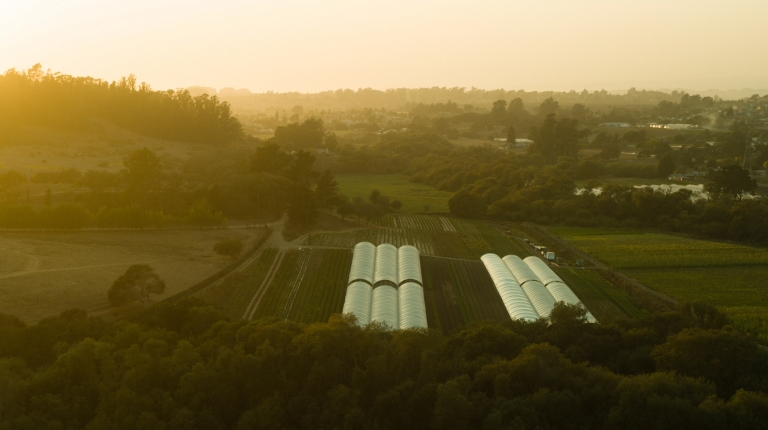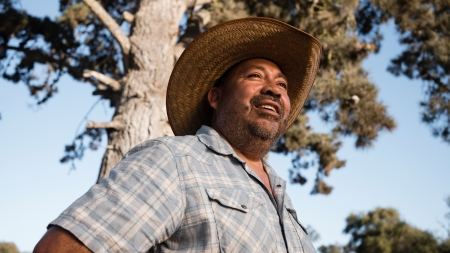¡Échale ganas!
Only 4 percent of US farm owners are Hispanic. Mexican immigrant and organic farmer Javier Zamora is working to change the narrative.
All photos by Greg Mionske
“Hola, amigo! Is it cool if I lie down?” asks organic farmer Javier Zamora. I video-called him at 7 p.m., right when he was getting home from a day on the farm that started at 4:30 a.m. I can tell he’s wiped out, but mostly in a satisfied kind of way. He dims the lights.
Over the past 11 years, I’ve served as an incubator program manager, education program manager and, most recently, program director for the Agriculture and Land-Based Training Association (ALBA). Based in California’s Salinas Valley, ALBA is an organization that trains farmworkers to become independent organic farm owners on its 100-acre training facility. I’ve worked with lots of folks during my career, but I’ve never met anyone quite like Zamora.
Born into a farming community in Michoacán, Mexico, Zamora immigrated to the US when he was 20 years old. “I went to an American high school in the suburbs of Los Angeles and had to become bilingual,” he says. “I have residency, which helps make life easier.” Instead of finishing high school, Zamora went to work in the restaurant and hospitality industries where his fun-loving and social nature helped him climb the ranks. “Yeah, man, I was exposed to all different backgrounds,” he recalls. “Rich people, poor people, bald people, tall people—social classes.”
It wasn’t until the economy crashed in 2009 and Zamora lost his home that he decided to return to his farming roots. At 43 years old, he moved to California’s Salinas Valley—known as the salad bowl of the world—to work at a nursery, finish his high-school education and study horticulture at Cabrillo College, where one of his professors suggested that he check out ALBA.
“Hey, I remember the first day I showed up [to ALBA],” Zamora says. “It was late in the course, but you told me if I could pass a test on organic production, you would let me join.” He passed and immediately started to stand out. Not a typical student, his bilingual skills were good enough that ALBA asked him to join the team as an interpreter. At the same time, he launched a little 1-acre farm on a property he was renting. While taking ALBA’s courses, Zamora was busy cultivating his relationships with folks in the local agriculture community and developing his unique style of production. “You had every inch of that place planted,” I recall. “My favorite was the chiles de árbol growing under the coast live oaks. Man, you even had stuff growing in pots on your trailer home’s steps.” We both laugh.
Zamora recalls the first time he visited the local chapter meeting of the region’s organic farmers: “There was like the Hall of Fame of local, small-scale organic farmers. Yeah, it was all white. They were surprised to see me, not in a mean or racist way, but just not used to a brown guy in the mix. It was kind of funny.”
Zamora quickly outgrew his 1 acre operation and purchased his own farm. Today, he is the owner of JSM Organics, where he grows organic vegetables, year-round strawberries and flowers on 200 acres along the cool slopes of northern Monterey County. He markets his products directly to natural food retailers and farmers markets and employs over 40 people. When I mention how some folks were afraid that he was growing too fast, he says, “I got into this game late. It was now or never.”

Whether you call it Steinbeck Country or the salad bowl of the world, California’s Salinas Valley has long been a focal point for agricultural labor relations.
We talk about the importance of having a supportive community in farming and how, for many farmworkers, that represents a cultural barrier. “Some folks coming from Mexico have a lot of mistrust. They need to open up,” Zamora says. “There are a lot of great resources to help get started, and it’s about learning who and what can help you. There is plenty of space and desire out there. I know there are several [people] right behind me and right next to me, too. It doesn’t matter what color. It’s about hard work. Time to echale ganas (give one’s best)!
“I even have workers whose second language is Spanish,” Zamora says. “Meaning they are from Indigenous groups in Mexico. I have other workers who help translate. I try to inspire [my workers] with the idea that the farm needs them, and they need the farm. Respect. And I pay them well. A few make more than me.”
Through his work with ALBA and other farm organizations, Zamora has become a spokesperson for small-scale Hispanic farmers in California and even up to the national level. He’s a self-described “open book” when it comes to his farming practices and business. He also leases small parcels of his land to beginner farmers and assists in marketing their products—and he does all of this in addition to running JSM Organics.
On my computer screen, I can see Zamora lying down in his darkened office. He’s been happy to answer my questions, but I can tell he’s exhausted. Tomorrow, he’ll be up before dawn and back at it. I ask him why he does it—why he spends so much time giving back. “I do it to ease the pain of those getting started,” he says. “There is no one else stepping up, or at least very few, to be the voice of farmers like me. So, I kind of have to.”
Zamora exits a hoop house in Salinas, California.
Farmworkers pick strawberries along the cool slopes of northern Monterey County. JSM Organics, Royal Oaks, California.
Strawberries by sunrise. JSM Organics, Royal Oaks, California.
Javier and his daughter Cynthia Zamora in the office at JSM Organics, Royal Oaks, California.
Zamora’s day typically begins well before dawn and ends after dusk. Royal Oaks, California.
A farmer loads a truck at the ALBA headquarters in Salinas, California.
“There is plenty of space and desire out there,” says Zamora. “It’s about hard work.” Sunset in California’s Salinas Valley.








